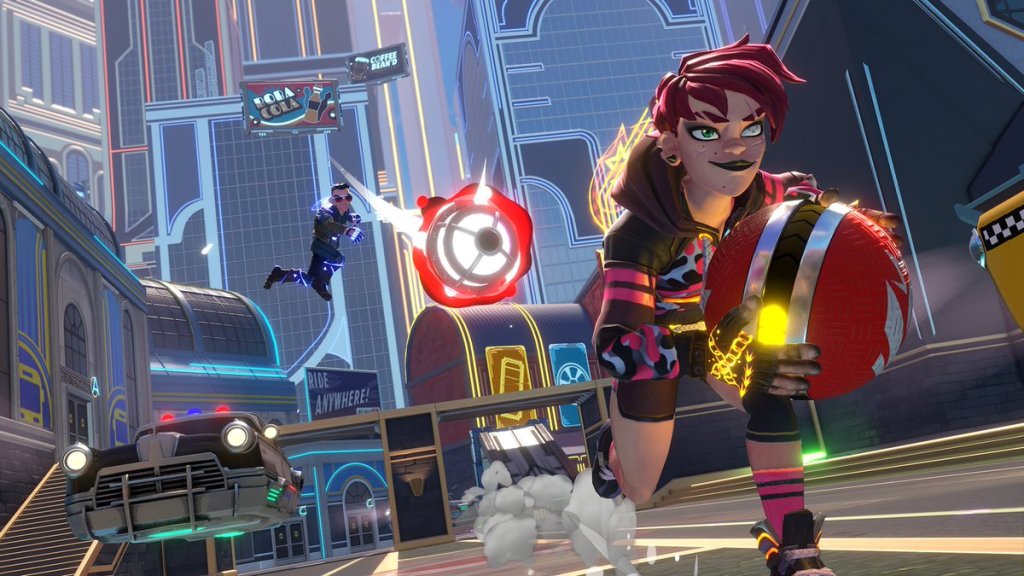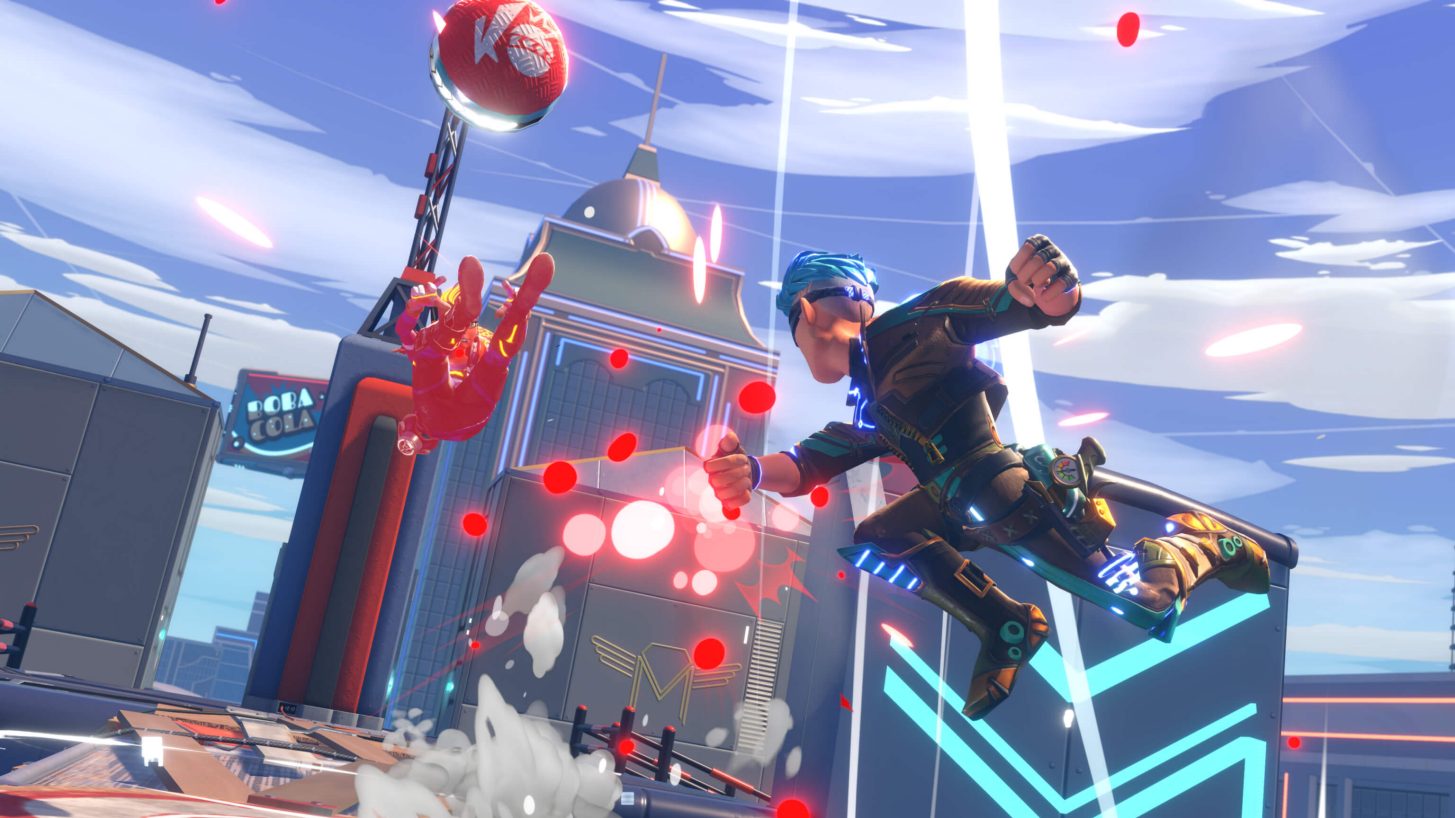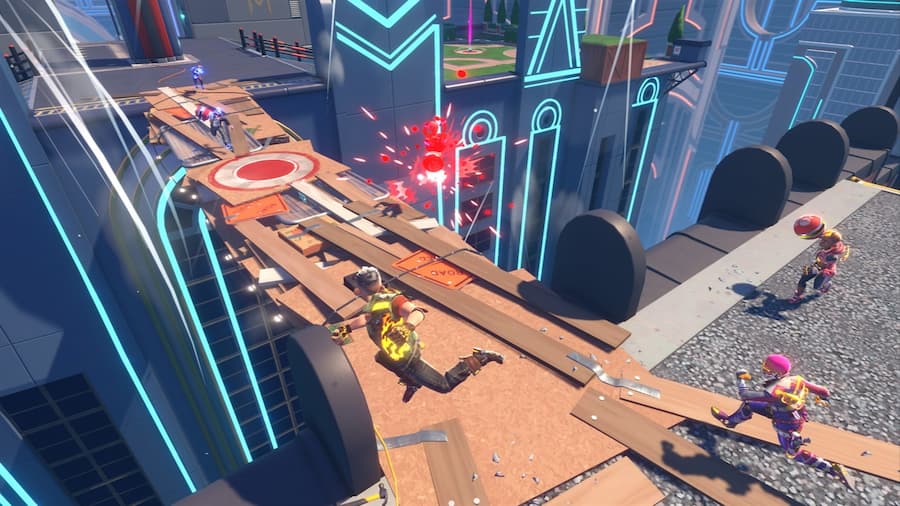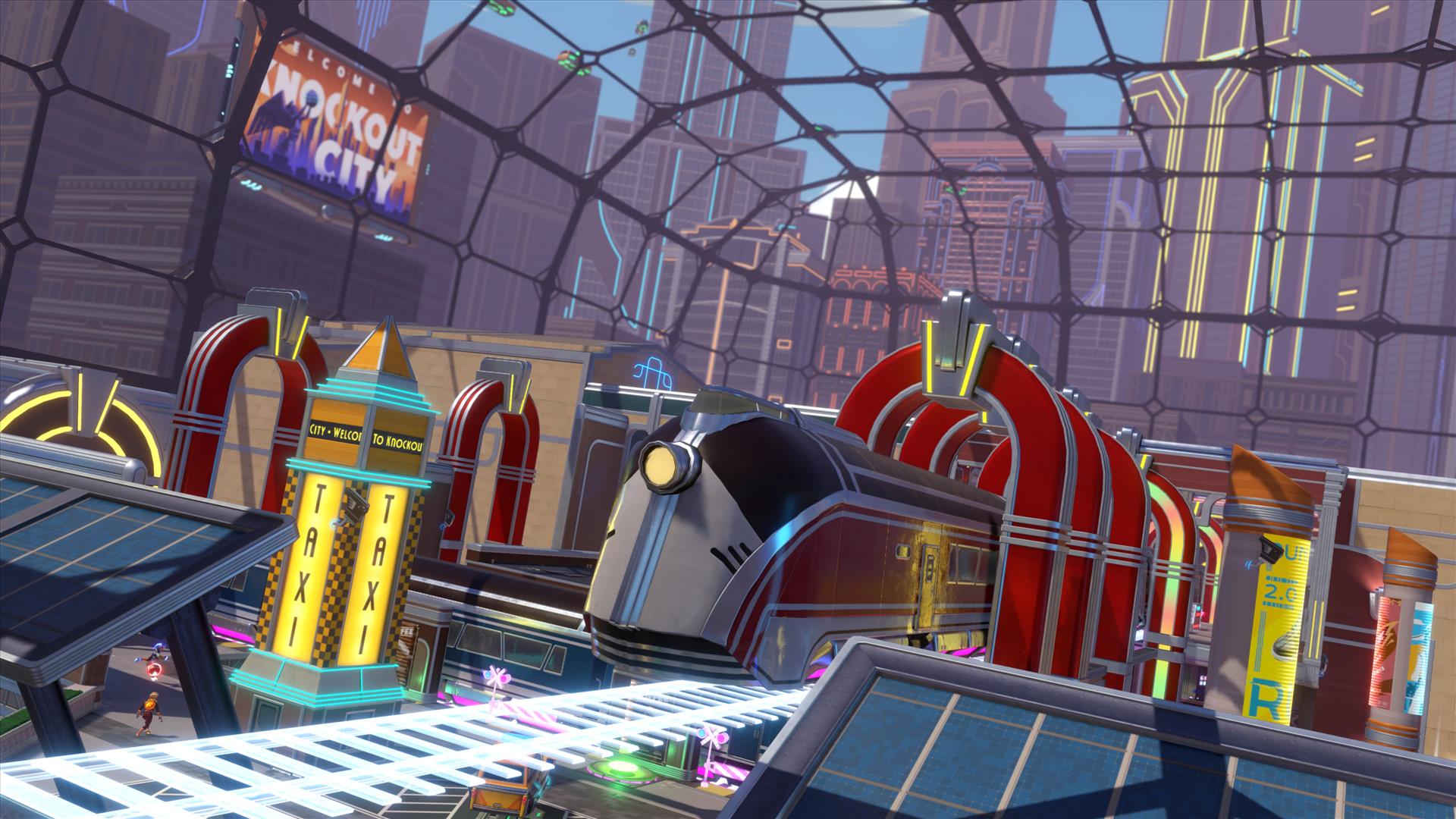There are a few notable games that have come in and done things so completely different, that people can’t help but pay attention. Experiences that seem small on the surface, yet hide a perfect formula for addictive fun that you can’t get enough of. Velan Studios tapped into something special when they landed on dodgeball, the age old game that most people have a love/hate relationship with. Knockout City isn’t just a match of the classic schoolyard game however. It’s dodgeball taken to a whole other level; a new way of looking at those red rubber balls. It’s dodgebrawl. It’s Knockout City, baby.
Knockout City is just as addictive as dodgeball itself, and it comes without the risk of getting smacked in the real face with a real rubber ball. The brilliance comes in how perfectly the mechanics encapsulate something different that just another shooter. This isn’t a game about perfect aim and “clicking heads” with rubber balls rather than bullets. In fact, you mostly don’t even need to aim at all. Knockout City’s autotargeting system takes care of that for you, as long as an opponent is within your line of sight. The ball will mostly fly right at them as long as they don’t dodge behind cover.
With targeting handled by the game, players are free to worry more about positioning and timing. In some ways, Knockout City has more in common with fighting games than shooters. Holding R2 will charge your shot and make the ball fly faster. Tapping L2 will allow you to catch the ball, granted you hit it at the right moment. Too early and you’ll be beaned in the recovery frames that follow. Too late, and, well… that seems kind of obvious. Fortunately, there’s a pretty generous window for catching, so don’t think this is some kind of hairpin precision game where you have to be absolutely perfect to play. Amidst all of the chaos in Knockout City, Velan landed on some generous timing that doesn’t make it feel impossible to engage with.
There’s a red border that appears around the edge of the screen whenever somebody has you in their sights, and an indicator of which direction it’s coming from. That indicator changes depending on whether or not they’ve thrown the ball, and learning to read these warning signs is key to either getting out of the way or catching the incoming projectile. It seems like a lot of information to take in at first, but removing the need to actually precision aim frees up a lot of information processing, and eventually reading the warning borders becomes second nature.
Knockout City Review – A True Underdog Story
Knockout City has a smooth learning curve. The controls are simple, and it’s easy to just hop in and start chucking, dodging, and catching balls. But there’s plenty of nuance that keeps things interesting, with a high skill ceiling that allows players to improve their skills with trick shots, fake outs, and clever positioning. You can pass the ball instantly to your teammates (again, without the need to aim) to give them a charged shot that will travel faster. If your teammate already has a ball, yours will bounce back to you charged up and ready to fly. This little trick can help out a teammate who is on their heels and cornered. It can change up positioning and angles of shots in an assault on the opposing team. Used well, the passing mechanic adds a whole new layer to Knockout City. You don’t have to use it, but those who do will benefit.
Additionally, you can pull off some trick shots to mess with the timing of the other team’s catches. Tapping Circle to spin will curve your shot, sometimes letting you thread the needle around obstacles to hit opponents. Triangle, on the other hand, will do a lob shot, tossing the ball in an arc that can make it over things that might be in your way. You won’t always want to use trick shots—sometimes the environment can be detrimental to these techniques—but they’re just another tool in the arsenal of skills you should employ to win each match and bean your opponents with balls.
Special Balls further change the playing field. At the start of each match, a random special ball is selected and will spawn across the map. These spawns aren’t so rare that you’ll never get your hands on one, but also aren’t so common that the match becomes a spam of special balls. Special Balls can range from the football-shaped Sniper Ball that lets you target enemies at a longer distance to the Multiball that gives you three pinball-like balls to throw in quick succession, and a few more that can really change up any match. The sniper ball lets off the crack of a gunshot at a full charge, while mutliball elicits an announcement that one is in play and metallic pinball dings as they are thrown about. The sound design perfectly encapsulates what’s going on at any given moment.
And if you can’t find a ball? Well you can just ball up for one of your teammates to throw. Ball form lets you become the ball, and it has its benefits. Hitting an opponent with a player in ball form is an instant KO, knocking out two hearts at once, while the other balls just take one. But be wary. If they manage to catch your shot, they can toss your teammate right back at you. It’s an excellent bit of risk/reward gameplay that really ramps up the intensity. You can also do a charged shot which sensd the ballform player high into the air. When they come crashing down, every opponent in the blast radius is knocked out. Scoring a sweet triple kill this way is always so satisfying, but again, if you should miss, you’ll be left vulnerable for a few moments after landing, so decide on the perfect time to use this technique.
Knockout City Review – More Than One Way to Toss a Ball
At launch, there are four main playlists, but those will be updating weekly. Initially, we’ve played a lot of Team KO (standard 3v3, first to 10 KOs wins), Diamond Dash (players must collect diamonds that drop from KOd players), and Team Party KO (all special balls, all the time), along with Face Off, a tight 1v1 tournament of skill. Velan has committed to adding new modes and rotating the playlists weekly so Knockout City always feels fresh and interesting to come back to. Even just the differences between Team KO and Diamond Dash change how people play the game. Diamond Dash requires a lot more aggression to collect diamonds, where Team KO allows for more cautious play at a distance.
And all of this takes place across a few different levels, each with clever and unique designs that alter the playing field in major ways. From a stage on two rooftops with a precarious wooden bridge between them, to a rotating burger joint with a lot of verticality and places to fall off the map, each arena has a unique defining feature that can either help or hinder you in big ways. This makes each level play rather different from one another. It might be good to lob your teammate for an ultimate shot on the rooftop level, but that strategy might not be quite as sound in the cramped back alleys.
Even within each level, matches play out very differently. Sometimes everyone is rushing into a central area for insane dodgeball chaos. Sometimes teams play cautious and around the edges of the maps. The combination of maps, special balls, modes, and even just the team makeups and strategies each side utilizes means that no two matches play the same at all. Every moment of every match is a crossroads of decisions to make. Throw your teammate for an ultimate lob? Wait and try to catch and return? Run for that distant special ball? Regroup with your team or try and play hero to take out an entire team on your own? That’s the magic of Knockout City.
Perhaps what impresses me the most about Knockout City is how tactile it is at every turn in order to help you make that sheer variety of possible decisions all the more manageable.. There are clear indicators for everything in the game, from UI elements to sound effects that communicate exactly what is going on at any given time. Despite a game that could have been pure messy chaos, Knockout City manages to find a kind of zen order in that frantic ballet of rubber balls. The mechanics feel generally balanced and fair, and while you’ll still take a few beans to the dome, you can usually figure out exactly what you did wrong (or the other team did right) to knock you out.
Knockout City is full of cosmetics to earn to customize your characters (you get three different cosmetic loadouts), each new piece full of the same kind of flair and attitude seen throughout the rest of the game. It leans on a Battle Pass-like system of unlocks; a permanent path called “Street Rank.” Items are randomized within the Street Rank unlocks, so everyone won’t be unlocking everything in the same order. It’s a novel system that really drives the unlocking of new stuff. It adds that exciting element of getting a random unknown reward from a loot box, but puts it on a targeted (and non-monetized) path that you can grind out clearly.
If there is even one small area of criticism I have, it’s the inability to access the full menu in the match lobby. In order to customize your character or check your Street Rank, you have to back out of matchmaking into your hideout to play around with visual customization. I wish the game allowed the hideout to be the game’s lobby while the matchmaking went on so that you could practice, customize your brawler, and peep what the next unlocks you are working towards are. This is part of a few odd menu quirks that are inconsistent between the matchmaking and the hideout. It’s a very small complaint in the grand scheme of things, but with how polished everything else is, I’d love to see this user experience enhanced with a future quality of life update.
And speaking of updates, we’re not done yet. Knockout City is just getting started, and perhaps even as you are reading this, Season 1 is just launching. Starting May 25th, there’s a new map coming—Jukebox Junction, featuring moving trains. This will also launch the competitive playlist called League Play. And of course, there will be plenty of other surprises in store with added game modes, new special balls, and more. All of this content will be added free to the game, which launched at just $19.99 (following the free Trial window for the first 10 days). The path to getting people into this game is surprisingly smooth, as is the roadmap to keep people tossing balls in Knockout City.
I can’t get enough of Knockout City. Velan Studios put an impressive amount of work into a confluence of themes and mechanics that all work together in harmony for a symphony that resonates with a rubbery thwack. Everything feels polished to a degree that is rather monumental for a day one launch, and their plans to support Knockout City for the foreseeable future will ensure it stays downloaded on my hard drive. Every once in a while, a special game comes along that redefines the rules; that finds a unique concept that nobody knew they wanted, but that everyone ends up loving. Knockout City is one of those special games, a passion project built on originality that will surely go on to be bigger than anybody could have initially imagined.
Knockout City review code provided by publisher. PS4 version reviewed on PS5. For more information, please read our Review Policy.
-
Unique concept that takes dodgeball to new heights
-
Mechanics are polished, easy to engage with
-
Lots of room for decision making, every match is different
-
Ongoing support plans for the future
-
Some odd menu quirks that can be a little confusing.
-
I want to be playing Knockout City at every waking (and sleeping) moment








